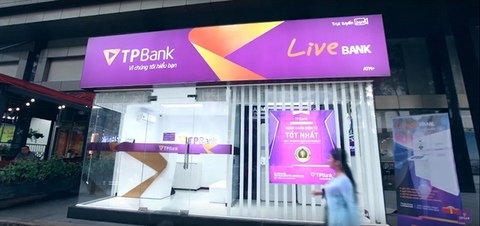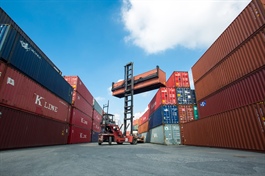Banks improve costs to income ratio thanks to digital transformation
Banks improve costs to income ratio thanks to digital transformation
Many banks have cut their costs to income ratio (CIR) thanks to digital transformation to optimise operations, which greatly contributed to their positive business results in the first quarter of 2023 despite the challenging market context.

TPBank has a LiveBank model, which provides basic services of a transaction office. Many banks have cut their costs to income ratio thanks to digital transformation. — Photo courtesy of TPBank |
The financial report for the first quarter of 2023 of VietinBank showed the bank’s positive business results were greatly contributed to by the good control of expenses. The bank’s CIR was cut to 25.3 per cent from 27.2 per cent in the same period last year. Thanks to the cost reduction, the bank’s net profit from business activities reached more than VND12.7 trillion, up 24 per cent over the same period of 2022.
At VIB, the CIR ratio dropped sharply from 35.3 per cent to 31.8 per cent in Q1 2023. The good cost control helped VIB's net operating profit reach VND3.36 trillion in Q1 2023, up 25.6 per cent over the same period last year.
ACB is also one of the banks that reduced significantly the CIR ratio in the first quarter of this year from 40 per cent to 31.6 per cent. The bank's operating expenses also fell 8 per cent year-on-year to VND2.5 trillion while operating income increased by 15.6 per cent to VND7.92 trillion.
Statistics from the financial statements of 28 banks in Q1 2023 showed their current CIR ratio had a significant difference. Effective banks such as VIB, ACB, Techcombank and MB had with average CIR around 30 per cent while other banks were less effective with operating expenses accounting for nearly half of the total income.
Not only in 2023 but reducing CIR is a long-term goal of banks as it is an important indicator that measures how the bank's resources are used. The lower the CIR ratio is, the better the bank operates. Vice versa, the higher this ratio is, the higher the bank has operating costs which becomes a burden to narrow its profitability.
In fact, reducing operating costs is very difficult because banks have to continuously invest to expand their scale and increase customer experience. Therefore, the problem is that the bank will have to find a way so that the growth of costs is lower than income. It means their investment has high efficiency and optimise their operational efficiency. This requires a drastic reform of the operating model of banks. In recent years, banks have poured a lot of money into technology investment and consider digital transformation as one of the decisive keys to reducing CIR.
Typically, TPBank has a LiveBank model, which provides the basic services of a transaction office. The bank’s automated transaction points have much lower investment and operating costs than traditional transaction offices, but are still highly efficient as they can reach many users and operate 24/7.
VIB has pioneered in the application of AI technology, biometrics and many other outstanding technologies, such as cloud–native and augmented reality (AR), to enhance customer experience. The strong investment in technology early on has helped this bank rapidly grow the retail segment. The transaction rate on digital channels at VIB currently reaches 93 per cent. While the cost per transaction on digital banks is much lower than in transaction offices, it has helped the bank to optimise operations.
Digital transformation has also helped improve banks’ employee productivity, reduce paperwork and shorten processes. Instead of massively recruiting like in the past, banks have also focused on training personnel and attracting talent to improve the productivity of each employee.
Effective investment in technology, infrastructure and people to promote growth will help cut the CIR ratio in the long term, which is the driving force for the banks’ sustainable growth.




















